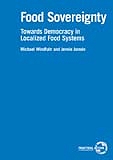 “ITDG commissioned this paper by FIAN as a contribution to the discourse on Food Sovereignty, the rapidly developing food and agriculture policy framework. In a world plagued simultaneously and perversely by hunger and obesity, rational policies are overdue for governing the way food is grown, processed and traded, and how the benefits of the world’s food systems are shared.
“ITDG commissioned this paper by FIAN as a contribution to the discourse on Food Sovereignty, the rapidly developing food and agriculture policy framework. In a world plagued simultaneously and perversely by hunger and obesity, rational policies are overdue for governing the way food is grown, processed and traded, and how the benefits of the world’s food systems are shared.
Most food in the world is grown, collected and harvested by more than a billion small-scale farmers, pastoralists and artisanal fisherfolk. This food is mainly sold, processed, resold and consumed locally, thereby providing the foundation of peoples’ nutrition, incomes and economies across the world. At a time when halving world poverty and eradicating hunger are at the forefront of the international development agenda, reinforcing the diversity and vibrancy of local food systems should also be at the forefront of the international policy agenda. Yet, the rules that govern food and agriculture at all levels – local, national and international – are designed a priori to facilitate not local, but international trade. This reduces diversity and concentrates the wealth of the world’s food economies in the hands of ever fewer multinational corporations, while the majority of the world’s small-scale food producers, processors, local traders and consumers including, crucially, the poor and malnourished, are marginalised.”



Comments are closed